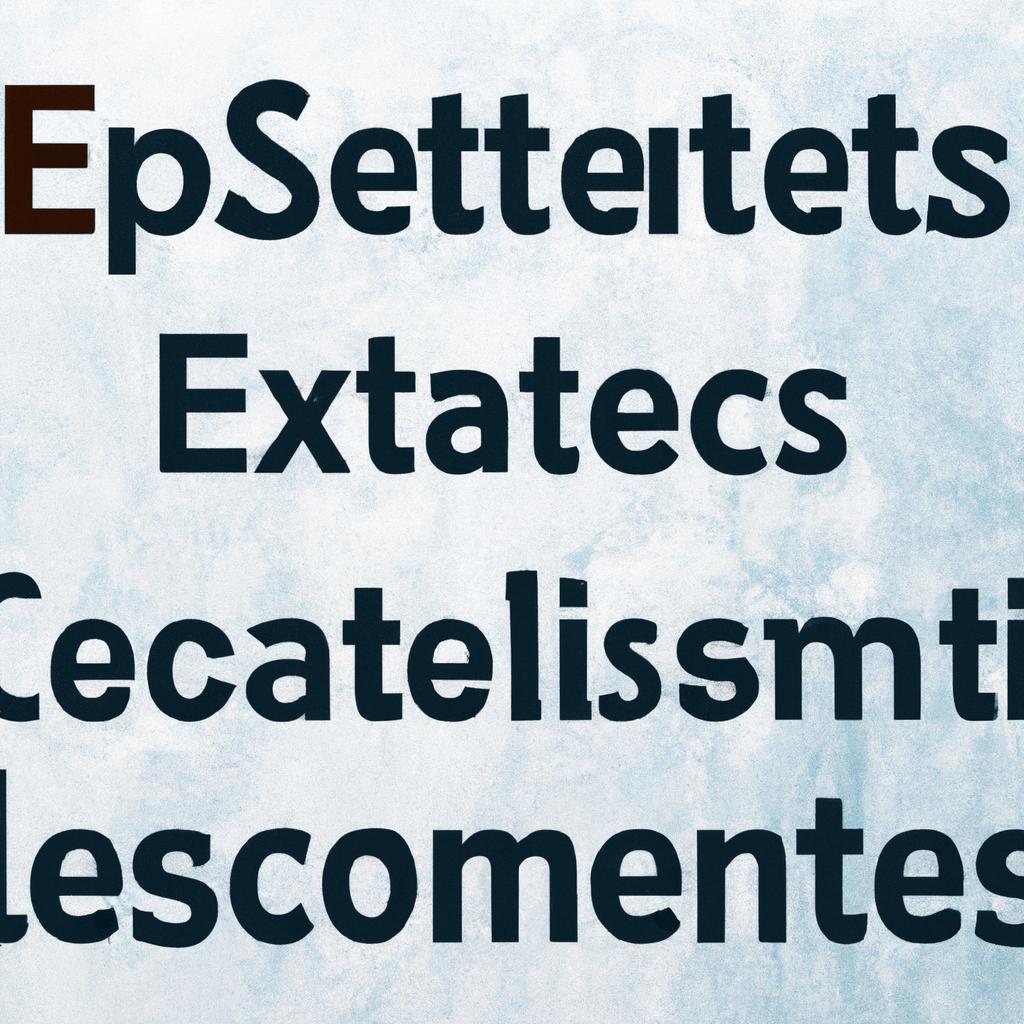When a loved one passes away, their estate is typically left behind for their heirs to settle. However, what happens if an estate is not settled? This question can be a complex and daunting one, with potential legal and financial repercussions for all parties involved. As experienced lawyers at Morgan Legal Group in New York City, we have seen firsthand the challenges that can arise when an estate goes unadministered. In this article, we will delve into the consequences of failing to settle an estate, and offer insights into the steps that can be taken to avoid such pitfalls.
Consequences of Failing to Settle an Estate
Failing to settle an estate can have serious repercussions that can impact not only the deceased individual’s assets but also the beneficiaries and heirs involved. One of the primary is the potential for legal disputes among family members. Without a clear and legally binding plan in place, family members may argue over the distribution of assets, leading to costly and lengthy court battles.
Furthermore, failing to settle an estate can result in financial losses for the beneficiaries. Unsettled estates may lead to delayed access to inheritance, which can impact the financial stability of the beneficiaries. In addition, unresolved debts and taxes can accumulate on the estate, leading to potential penalties and interest payments that can reduce the overall value of the assets.

Legal Ramifications for Unresolved Estates
When an estate is left unresolved, it can lead to a variety of legal ramifications that can impact both the beneficiaries and heirs involved. Without proper estate planning and settlement, the assets of the deceased individual may be distributed according to state laws, which may not align with their wishes. This can result in family disputes, delays in asset distribution, and added stress during an already difficult time.
Furthermore, unresolved estates can lead to financial liabilities for the beneficiaries if debts of the deceased are not properly addressed. Creditors may come after the assets of the estate, leaving beneficiaries with less than they anticipated. Additionally, taxes on the estate may be higher without proper planning, leading to a significant reduction in the assets available for distribution. It is crucial to seek legal guidance to ensure that the estate is settled properly to avoid these potential pitfalls.

Challenges Faced by Heirs of Unsettled Estates
When an estate is not settled, heirs face a myriad of challenges that can cause significant stress and financial burden. One of the primary issues that heirs may encounter is uncertainty regarding their inheritance. Without a clear resolution of the estate, beneficiaries may not know what assets they are entitled to, leading to confusion and disputes among family members.
Additionally, the legal process of settling an estate can be complicated and time-consuming. Heirs may be required to navigate complex probate proceedings, track down missing assets, and resolve any outstanding debts or claims against the estate. Without proper guidance and legal assistance, heirs may struggle to successfully navigate these challenges and secure their rightful inheritance. **In such situations, seeking advice from experienced estate planning attorneys like Morgan Legal Group can help heirs effectively navigate the complexities of settling an estate and ensure that their rights are protected.**

Key Steps to Avoid Complications in Estate Settlements
In the unfortunate event that an estate is not settled properly, it can lead to a myriad of complications and challenges for all parties involved. Some of the key steps to avoid these issues include:
<ul>
<li><strong>Communication:</strong> Maintaining open and transparent communication with all beneficiaries and stakeholders to ensure everyone is informed and involved in the process.</li>
<li><strong>Documentation:</strong> Keeping detailed records of all assets, debts, and transactions related to the estate to prevent any disputes or confusion down the line.</li>
<li><strong>Legal Assistance:</strong> Seeking the guidance of an experienced estate planning attorney to navigate the complexities of probate and ensure all legal requirements are met.</li>
</ul>By following these key steps, you can mitigate the risk of complications in estate settlements and ensure a smooth and efficient process for all parties involved. At Morgan Legal Group, we specialize in estate planning, probate, elder law, Wills, and trusts, and are here to help you navigate the complexities of estate settlement with confidence and ease.
Q&A
Q: What happens if an estate is not settled?
A: When an estate is not settled, it can lead to a multitude of complications and legal issues.
Q: What are some of the consequences of not settling an estate?
A: Some consequences include prolonged court proceedings, disputes among heirs, financial losses, and potential damage to family relationships.
Q: How can not settling an estate impact the beneficiaries?
A: Beneficiaries may face delays in receiving their inheritance, uncertainty about their entitlement, and increased stress and frustration in dealing with the estate.
Q: Are there any legal implications of not settling an estate?
A: Yes, not settling an estate can result in legal action being taken against the executor or administrator for failing to fulfill their duties.
Q: What steps can be taken to avoid complications from an unsettled estate?
A: It is important to have a clear and updated will, designate a responsible executor, keep detailed records of assets and debts, and communicate openly with family members about the estate plan.
Key Takeaways
In conclusion, failing to settle an estate can lead to a variety of complications and potential consequences for all parties involved. It is important to prioritize the process of settling an estate in a timely and efficient manner to ensure that assets are distributed in accordance with the deceased’s wishes and to avoid potential legal disputes and financial burdens. Be sure to seek guidance from legal professionals and estate planners to navigate through the complexities of estate settlement and protect the interests of all parties involved.
 Introduction
Introduction
When a loved one passes away, their estate must be settled. This involves distributing their assets, paying any outstanding debts and taxes, and following the instructions laid out in their will. However, there are times when the estate is not settled immediately, either due to legal disputes, the absence of a will, or other complications. In this article, we will explore what happens if an estate is not settled and the potential consequences of delays in the settlement process.
Why an Estate May Not Be Settled
There are various reasons why an estate may not be settled promptly. Some common reasons include:
– Legal disputes: One of the most common reasons for an estate to be held up is legal disputes over the distribution of assets. These disputes can arise for various reasons, such as the validity of the will or disagreements among family members.
– No will: If the deceased did not leave behind a will, known as dying intestate, it can complicate the settlement process. Without a will, the estate will be distributed according to state laws, which may not align with the individual’s wishes. This can lead to further complications and disputes among family members.
– Outstanding debts and taxes: An estate cannot be settled until all outstanding debts, taxes, and other financial obligations are paid. This can take time, especially if the deceased had a significant amount of debt.
– Incomplete documentation: The settlement process also requires a lot of paperwork and documentation, including asset titles, insurance policies, and financial statements. If any of these are missing or incomplete, it can hold up the process.
Consequences of Delayed Estate Settlement
Delays in settling an estate can have several consequences, including financial, legal, and emotional implications. Some of these include:
– Financial consequences: When an estate is not settled, the assets cannot be distributed, which can lead to financial difficulties for beneficiaries who may be relying on their inheritance. It can also result in lost opportunities for investments or financial growth.
– Legal consequences: When an estate is not settled, it opens the door for legal disputes among family members and creditors. This can be a costly and emotionally draining experience for all parties involved.
– Emotional consequences: Dealing with the loss of a loved one is already a difficult and emotional process, and delays in estate settlement can prolong the grieving process. It can also strain relationships among family members, especially if there are disputes over the distribution of assets.
Benefits of Prompt Estate Settlement
On the other hand, there are several benefits to settling an estate promptly. These include:
– Closure: Prompt settlement of an estate allows for closure for both the beneficiaries and creditors. It allows them to move on with their lives without the added stress and uncertainty of the settlement process.
– Reduced costs: Delayed settlement can lead to increased legal fees and other expenses, such as property taxes and insurance premiums. Settling the estate promptly can help minimize these costs.
– Maintain relationships: Settling an estate promptly can prevent disputes among family members, helping to maintain healthy relationships.
Practical Tips for Prompt Estate Settlement
If you are the executor of an estate or a beneficiary waiting for the settlement, here are some practical tips to help expedite the process:
– Hire an experienced estate attorney: A knowledgeable estate attorney can guide you through the settlement process, ensuring all legal requirements are met.
– Communicate with all parties involved: Open and clear communication with family members, creditors, and other parties involved can help prevent disputes and expedite the process.
– Gather all necessary documentation: Make sure you have all the required documentation, including the will, death certificate, and asset titles, to avoid delays.
– Prioritize outstanding debts and taxes: To speed up the settlement process, it is essential to prioritize paying off outstanding debts and taxes.
– Seek mediation for disputes: If there are any disputes over the distribution of assets, consider seeking mediation to resolve them amicably and avoid costly legal battles.
Case Study: The Importance of Prompt Estate Settlement
A recent example of the consequences of delayed estate settlement is the case of Prince’s estate. The legendary musician passed away in 2016 without a will, causing a legal battle over his assets. The settlement process took several years and resulted in a significant chunk of his estate going towards legal fees and taxes, leaving less for his beneficiaries. This case highlights the importance of prompt estate settlement to avoid unnecessary costs and disputes.
First-Hand Experience: Missing Will Causes Delays in Estate Settlement
Jane Smith* was appointed the executor of her father’s estate after he passed away. However, she soon realized that her father had not left a will, making the settlement process more complicated and lengthy. It took nearly two years to settle the estate, delaying the distribution of assets to her and her siblings and causing tension within the family. Jane advises anyone writing a will to ensure they have one in place to avoid such delays and potential disputes.
Conclusion
In conclusion, an estate that is not settled promptly can have various consequences, both financial and emotional. It is essential to plan for the settlement of your estate to ensure your last wishes are carried out efficiently and to spare your loved ones unnecessary stress and disputes. If you are a beneficiary, it is advisable to seek legal assistance to help expedite the process and avoid potential complications. Remember, proper planning and communication can help ease the burden on your loved ones during an already challenging time.
*Name changed for privacy purposes.


